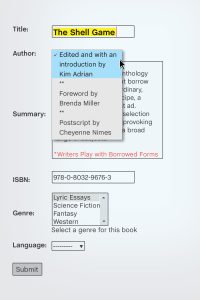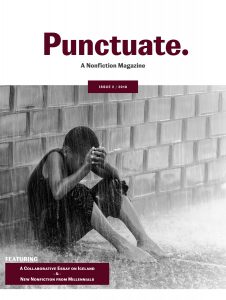The Shell Game: Writers Play with Borrowed Forms
Edited and with an introduction by Kim Adrian
Foreword by Brenda Miller
Postscript by Cheyenne Nimes
276 pages, paperback, $24.95
University of Nebraska Press
April, 2018
Shell Games
 When you think about the “essay,” what comes to mind? Perhaps you associate the form with early essayists—Montaigne, Lamb, Woolf—or you may think about Baldwin and Didion, whose works incisively and artistically depict the perils and peculiarities of American life. While all these essayists covered subject matter that varied in scope, their essays all employ a similar long-form style in an attempt to mimic the movements of thoughts in the mind while also translating them vis-à-vis the voice on the page. But what happens when writers play with form? What essays may they then create? In the anthology The Shell Game, published by University of Nebraska Press, Kim Adrian has curated a selection of thirty essays that adopt different forms in order to present new ideas, compose startling images, and provide a deeper understanding of the relationship between form and content.
When you think about the “essay,” what comes to mind? Perhaps you associate the form with early essayists—Montaigne, Lamb, Woolf—or you may think about Baldwin and Didion, whose works incisively and artistically depict the perils and peculiarities of American life. While all these essayists covered subject matter that varied in scope, their essays all employ a similar long-form style in an attempt to mimic the movements of thoughts in the mind while also translating them vis-à-vis the voice on the page. But what happens when writers play with form? What essays may they then create? In the anthology The Shell Game, published by University of Nebraska Press, Kim Adrian has curated a selection of thirty essays that adopt different forms in order to present new ideas, compose startling images, and provide a deeper understanding of the relationship between form and content.
In the forward, Brenda Miller outlines the basis of The Shell Game by describing a hermit crab:
A hermit crab is a strange animal, born without the armor to protect its soft, exposed abdomen. And so it spends its life occupying the empty, often beautiful, shells left by snails or other mollusks. It reanimates these shells, making of them a strange new hybrid creature.
As a result, a “hermit crab essay” is an essay that occupies an alternative form, which makes manifest what is vulnerable through a structure that is wholly unique and hybrid in nature. The Shell Game does not disappoint: essayists adopt—or is it adapt?—an online dating profile, a Rubik’s Cube, crossword puzzle clues, captions, alphabetical lists, multiple choice tests, rejection letters among other “shells” to demonstrate the inextricable link between form and content.
More specifically, the essays reveal how prompts, fill-in-the-blanks, and other preformed structures can push or nudge writers into discovering entirely new meanings and the ways in which creation emerges from particular contexts. In “Ok, Cupid,” Sarah McColl writes, “Built-in constraints have interesting effects,” which is what we see as she composes a personal essay through answering the questions commonly asked on online dating profiles. The interesting effects continue in “Rubik’s Cube, Six Twisted Paragraphs,” wherein Kathryn A. Kopple melds the history of the Rubik’s Cube and Cubism with the story of her father. She creates the form of the Rubik’s Cube by writing in six blocks of square text that work at interlocking the two threads in more and more complex ways as the essay progresses.
Yet what makes these essays so compelling, however, is not only that they comply with their chosen form but also that they include moments where they transgress. For example, the theme of fatherhood continues in Dinty W. Moore’s “Son of Mr. Green Jeans: An Essay on Fatherhood, Alphabetically Arranged,” which employs alphabetical entries and an objective tone usually found in encyclopedias. But by the letter “I,” the objective, third-person breaks down and begins to reveal a first-person account of the speaker’s relationship with his father. Moreover, the satisfaction of “We Regret to Inform You” by Brenda Miller comes at the end when a series of life events composed as rejection letters finally resolve into an acceptance (of self).
While I have highlighted only a few essays in the anthology, there are so many others that are sure to catch your eye. Footnotes, science logs, parables, and government documents expand and collapse as the various essayists use form to construct (and reconstruct) meaning. Ultimately, The Shell Game may serve to expand what readers may think of when they think of the essay. Among the grocery lists and Post-It notes, comic sketches and sermons, and the other ephemera of our everyday lives, essayistic elements exist—searching for their shells.

